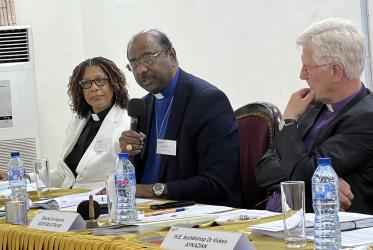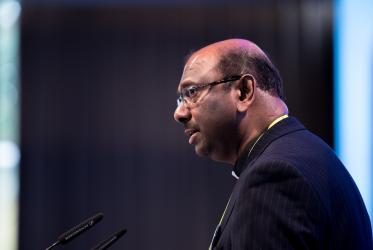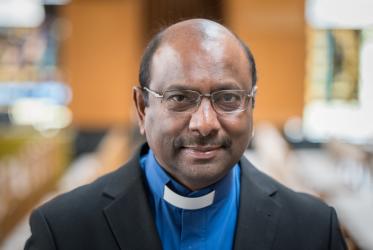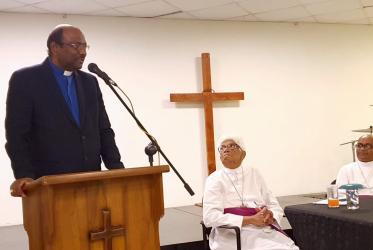Bible Readings:
Exodus 19: 9-25
Hebrews 11: 23-28
Matthew 25: 31-40
My sincere thanks and appreciation to all of you for your presence here today and to those joining us online. I am glad to share this special day with you in thanksgiving and praise to our Triune God.
I have here a watch. It is not an expensive one but let us imagine that it is an expensive gold watch. It may have all the glitter and attraction but if it is not able to tell the time then of what use is it? A watch is supposed to tell the time. That is its purpose! No matter how attractive and expensive it may look, if it cannot tell me the time then in essence it is useless.
The purpose of the Church is to proclaim the saving love and grace of Christ to the world. It does this as it goes out into the world to preach, teach, baptize and disciple believers. The Church ought to live to fulfil the purpose of God. This is captured also in the mission statement of the World Council of Churches: “a fellowship of churches, which confess the Lord Jesus Christ as God and Saviour according to the scriptures, and therefore seek to fulfil their common calling to the glory of the one God, Father, Son and Holy Spirit.” As a fellowship of 352 member churches, we come from different and diverse backgrounds to proclaim the same Lord Jesus Christ to the world.
Sometimes, the Church today seems to forget its real purpose in the world. Instead, we want to go our own way, seeking our own agendas and attempting to satisfy ourselves. We need to stop and ask: What does the Lord want? How can we fulfill God’s purpose? The Christian Church is called to proclaim God‘s grace and saving love in Jesus Christ to the world. When we fail to maintain our purpose then we lose the value of our message and the purpose of our very existence.
The Church today is going through an identity crisis as we seek to adapt to a changing world. In our quest for relevance we think that we have to give in to every new trend, view, philosophy and finding. So, we are always looking for the new thing or the next thing without often asking: “Is this the right thing? Is this what God wants?” Now, I am not saying that we must not discover and apply new things. In fact, that would be the exact opposite. The Church must rise up to the challenges and changing times to remain vigilant and relevant as we reach out to young people, people of other faiths and even no faith.
However, what concerns me most is how we have allowed society to influence the Church rather than have the Church to influence society. The Church today stands at a crossroads. In its quest for acceptance, political correctness, positive appreciation, power and wealth it stands neither here nor there – a position that has led to confusion and compromise. Hence our identity crisis!
The story of Moses has much to teach us about how to deal with an identity crisis. Exodus 19: 9-25 tell us that Moses knew that he is a servant of the Lord and he should remain obedient to God and God alone, difficult as that may be at times. Moses, in obedience, “brought the people out of the camp to meet God.” Many preachers and church leaders today are too focused on themselves rather than on leading people to meet God. Moses, we are told, consecrated the people to God. That is what every preacher and church leader is supposed to be doing, leading people to Christ.
The writer to the Hebrews tells us more about Moses in Chapter 11 when he speaks about the faith of Moses. Moses—called a son of Pharaoh`s daughter—had the world at his feet with opportunity, wealth, comfort and authority but “choose rather to share ill-treatment with the people of God than to enjoy the fleeting pleasures of sin. He considered abuse suffered for the Christ to be greater wealth than the treasurers of Egypt.”
We stand at the crossroads of a new world order, economic divides between the rich and the poor, immorality, racism, poverty, HIV and AIDS, secularization, religious fundamentalism, political corruption, abuse of women and children, gender discrimination and the list goes on. How does the Church respond to all these? From where do we start and where will we go? It is so easy to be swayed by political powers, economic benefits, fame and popularity so much so that we lose our purpose of being Church in the world.
In the midst of the things mentioned, we need to be brought back to our real purpose as churches and as an ecumenical movement. We need to proclaim the Risen Christ! We do that best when we are led back to the cross. Why? The cross and the resurrection speak of life, hope and victory in the midst of despair, defeat and death. More significantly the cross speaks of suffering-love, grace, forgiveness and restoration. It reminds us that Jesus came not to condemn the world but to save it. So our task as Church is to reach out to the suffering, sin-sick and lost world and to bring it into the love, grace and peace of Jesus Christ. The way we do this is to follow in the example of our Lord in suffering-love, humility, and grace. God calls us to fulfill God’s purpose in God’s way not in our way. The story of the prophet Jonah tells us this. The prophet is willing to do God’s will but in his own way. And, God has to struggle with him until God gets God’s way and Jonah does not. The story ends with a sulking prophet because he does not get his way. This speaks often times of the reluctant Church which is not willing to do what God calls it to do in God’s way.
As we serve God in and through the fellowship we need to constantly stop and ask: Are we in tune with God’s will and plan for us? Are we remaining faithful in proclaiming Christ in Word and deeds? Are we fulfilling the great commission as expressed in Matthew 28? Are we caring for the poor, hungry, thirsty, stranger, naked, sick and those in prison as expressed by Jesus in Matthew 25: 45: “I tell you the truth, whatever you did not do for one of the least of these, you did not do for me.” Jesus makes it abundantly clear where he stands. He stands with the poor, oppressed and captives (Luke 4:18). The Gospel makes it clear where the Church should stand if we chose to stand where God stands.
The great commission is a call not only to save souls but to transform the world and the lives of people who live in it as we care for the environment and the earth – making disciples requires this! The WCC realizes the need for creation care in the midst of environmental challenges, and it will establish a Commission on Climate Emergency and Sustainable Development, also a Commission on Health and Healing, among others. We do all of these as we seek to fulfill the Missio Dei, God’s mission in the world!
In this context of the world and the Church we need to ask how it impacts on theological education and training. We cannot do theology without interacting and engaging with the real world. The purpose of theology is to understand God’s word in the context of real life. It is ‘faith seeking understanding. The Nicene Creed reminds us that the Church is “One, holy, catholic and apostolic” in nature. Allow me to say a few words on these descriptions:
The Church is one reminds us that that God has called us to unity, and that unity is a gift from God. One of Jesus’ last prayers going to the cross was for the unity of believers so that the world may believe from our united witness to Him. Unfortunately, churches continue to fragment and we see this on a regular basis, which is, indeed, a tragedy in a world that is so divided and broken. The Church is divided by theological, doctrinal, ethical views and, sadly, by political, economic, social and ethnic issues, amongst other things. A divided Church can offer nothing but a weak and fragile witness to a broken world.
We need to be reminded that even though unity is a gift from God, we have to work on it and it does not come without effort and sacrifice. The tragedy is that we tend to emphasis the things that divide us rather than that which unites us in our common witness to Jesus Christ as Lord and Saviour of the world. We need to continue to struggle for Christian unity and witness in the world. The WCC is blessed to bring so many churches together; the last assembly was such a powerful witness to churches being together. Let`s not allow external factors to separate and divide us, instead let us allow the love of Christ to move us to reconciliation and unity.
In the assembly message and reflecting on the assembly theme, Christ’s Love moves the world to reconciliation and unity, the assembly proclaimed:
As reconciliation brings us closer to God and each other, it opens the way toward a unity founded in God’s love. As Christians we are called to dwell in Christ’s love and to be one (John 17). Such unity, which is a gift from God, and which arises from reconciliation and is grounded in his love, enables us to address the world’s urgent problems.
The Church is holy reminds us that we are set apart, distinct and different from the world. As John Calvin put it, we are the “theatre of God’s glory.” Are we? We are called to live in the world, to participate and share in it because this is God’s world in the first place. But we are reminded that sin, evil and selfishness are quite prevalent. Therefore, inasmuch as we are in the world we should not be of the world: living, doing, wanting and behaving as it does. Instead, we should live as followers/disciples of Christ. We are called to live out our holiness as salt and light in the world. How will the world know the difference if we as believers do not live an “alternate lifestyle” as taught by Jesus? A life that propagates justice, righteousness, peace, unity and love.
The Church is catholic speaks of the universal nature of the Church. It encompasses the whole of this planet. It is thus concerned about what goes on in other parts of the world and it stands in solidarity with those who suffer from all kinds of evil systems and oppressions. The Church is reminded that as the one body of Christ it “suffers when others suffer and rejoices when others rejoice.” What happens in Syria, Turkey, Ukraine, Russia, Palestine, Israel, Africa, Latin America, Myanmar and other parts of the world affects us all as part of the one human race and human chain.
We are called to be Church in partnership with other churches. It stresses the need for ecumenical connections and partnerships in the same mission of God to transform heal and bless the world with God’s peace. In this context, the Church is called to be the sacramental presence of God and a servant serving with the sacrificial love of Jesus Christ proclaiming hope to a fallen world.
The Church as apostolic tells us that it is a “called out and sent out community.” We are called by our Triune God, blessed by his presence and sent out to call and bless others in His name. We come so that we may “go and make disciples.” The Church does not exist just for believers; it actually exists for the world. The apostolic dimension reminds us that we are a missionary Church, the people of God constantly on the march for God, and we will not stop until God`s reign and return in Christ has come fully.
We, as the WCC, need to ask ourselves what we need to leave behind and what we need to embrace in order to move forward in Christ, with Christ and for Christ. Admittedly, these are not easy questions and particularly for the Church when we find ourselves in the middle of a crossroads and oftentimes in a crossfire. We need the faith and courage of Moses to choose the right thing, follow the right path and not waver from what God calls us to do.
The way to remain true, focused and steadfast is to stand before the cross of Jesus. The Church can only be a powerful voice and presence making a difference in the world if it submits to the Triune God. It can only succeed if it remains faithful to the Word of God and rests in the power of the Holy Spirit, for without the Spirit’s presence we are empty and dry striving in our own strength.
Once I was at a closing service of our assembly. Whilst the moderator was busy with his sermon I could not help but notice a beetle (bug) lying on its back and struggling to get on its feet again. The more it tried, the more tired it got. I felt the urge of leaning forward and turning it over but I was not going to disrupt the moderator’s sermon. So, I was waiting for the close of the service. Then suddenly there was a gush of wind from an opened window, it turned the beetle on its feet again and it moved away fast and steadily. Sometimes the Church is like that. We get stuck on some things which paralyse us to the point that we are unable to move. The more we try the more we seem to get tired because we are trying on our own strength. We need the wind of God’s Spirit to turn us on our feet again and to help us to move in God’s direction only. May God’s Holy Spirit lead us to be God`s presence and power in the world. Remember that the way to navigate your crossroads is to turn to Christ.
Some have spoken of an ecumenical winter and this has been reshaped in recent times by the call for an ecumenism of the heart. Friends, in a world that is riddled with conflict, war, factions, political instability, injustices, restlessness, suffering, strife and pain we need to pause and take a deep ecumenical breath to breathe afresh God`s life and hope into the world. The ecumenical movement needs to pause, pray and engage praxis (engaged action) to transform the world, to help it stand where God stands. In the face of injustices, war, conflicts and the danger to life and earth we need to reclaim our prophetic witness. The 11th Assembly Unity Statement observed, “We – the fellowship of the WCC – live and witness in a world which is at the same time God’s beautiful creation and broken by ecological crisis, war, pandemic, systemic poverty, racism, gender-based violence, human rights violations, and many other sufferings.” Yet in spite of these sufferings, we are called to give hope to the world, that it is possible to re-discover and re-claim “God’s beautiful creation.
I would like to suggest that we are now in an ecumenical spring as we see a revival of the Pilgrimage of Justice, Reconciliation and Unity which emerged from the last assembly. We need the kenotic, self-emptying spirit, courage and faith of Moses to side with the poor, needy, vulnerable, hopeless, neglected and abused. We need the courage to say no to ourselves, selfish desires and powers and external pressures and enticements. We need to stand where God stands with the poor, wretched, neglected and suffering in the world. The question is as member churches: Where will you stand?
I have here a watch that tells me the time. It serves its purpose. May we as the WCC fulfill God`s purpose in the world!
Rev. Prof. Dr Jerry Pillay
General Secretary
World Council of Churches





